China's drive to become a rugby union superpower
- Published
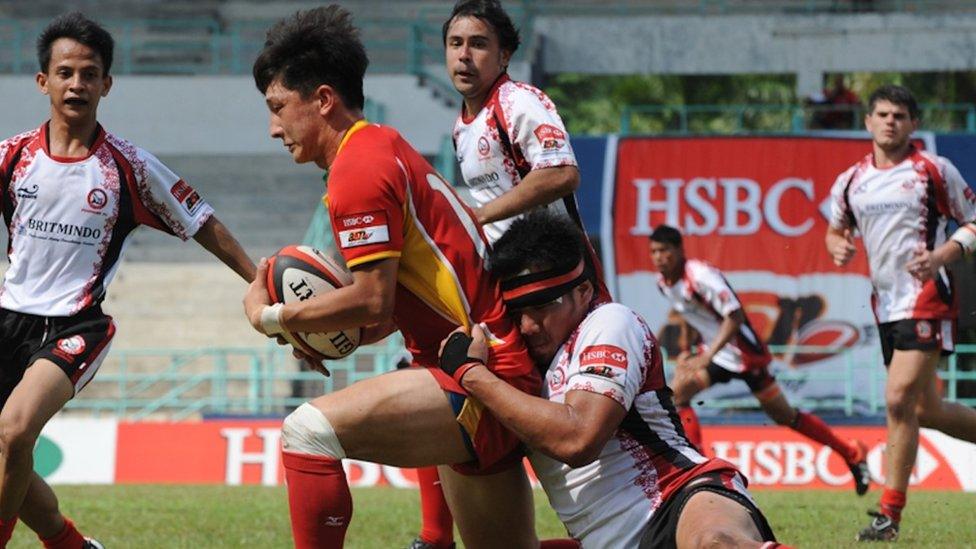
Football's growth drive into China has hit the headlines over the past couple of years, with wealthy investors from the country buying clubs both at home and abroad.
Now rugby union is also looking for a blossoming of awareness and investment in the world's most populous nation, where the government has recently embarked on developing domestic sport over the coming decades.
Chinese authorities are making a concerted effort to increase sporting participation from grassroots to elite levels, as well as creating a flourishing sports business sector.
Meanwhile, governing body World Rugby is committed to growing the game in new markets, and promoting the sport beyond its traditional "comfort zones" of the European and southern hemisphere heavyweights.
It is looking for growth in many countries, including Brazil, India and Russia, but it is China where they have struck it big - signing a $100m (£80.5m) deal, external that involves a professional league, university programmes and grassroots initiatives.
"World Rugby's strategic mission is to grow the global rugby family," says World Rugby chief executive Brett Gosper, adding that China is "central to that mission".
Women's game
Rugby union is seen as a sport with huge potential in Asia, especially after its inclusion in the Olympics, and Japan's strong showing at the 2015 World Cup.
Japan will host the next World Cup in 2019, and is the dominant rugby power in the region, one that arch-rival China will be looking to challenge in the future.
Participation in the sport in China has increased by 40% in the past year to 76,000 players. The new initiative, signed in partnership with company Alisports, and the country's rugby football association, will see the former invest $100m over the next 10 years in an effort to further popularise the game.
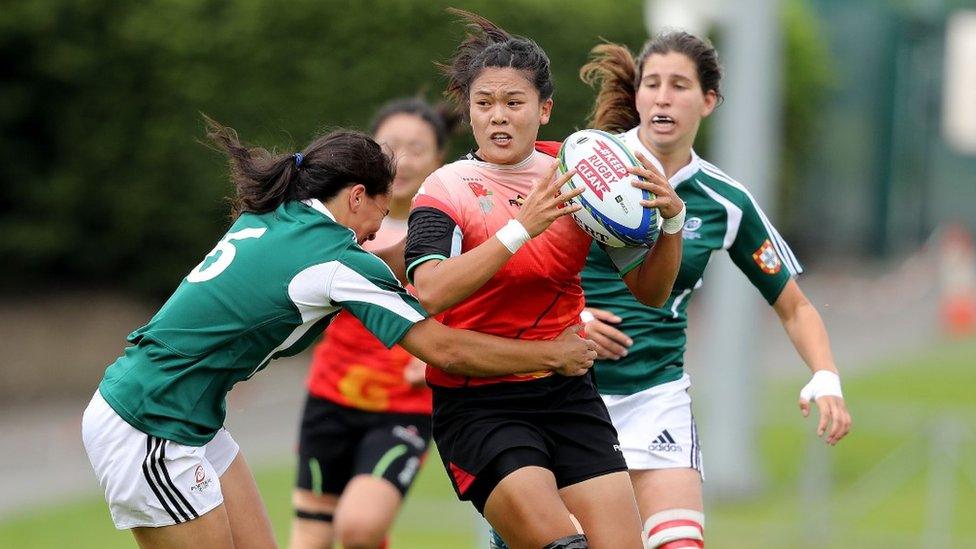
Money will also be used to promote the women's game in China
Alisports is the sports division of e-commerce giant Alibaba, and the money will be used to establish the first professional leagues for men and women, and national rugby sevens programmes.
And a mass-participation initiative will take place in up to 10,000 universities and schools.
Gu Xin, a reporter at Beijing-based sports marketing firm Yutang Sports, says rugby union is currently a "niche" sport in China compared with basketball, table tennis and badminton.
But he says it does have some presence, for example in universities, and that there are opportunities for development.
"It is not very expensive now to bring the sport here," he says. "To bring a major sport in the world into China now, with a relatively good price and to develop it, is good timing.
"As these [plans] move forward, there will also be good marketing and sponsorship opportunities for the sport."
'Great partner'
As part of the new growth plans, development schemes will also seek to recruit and train 30,000 coaches and 15,000 match officials by 2020.
Meanwhile, Alisports will launch a China-wide marketing programme, and broadcast rugby on its television and digital outlets.
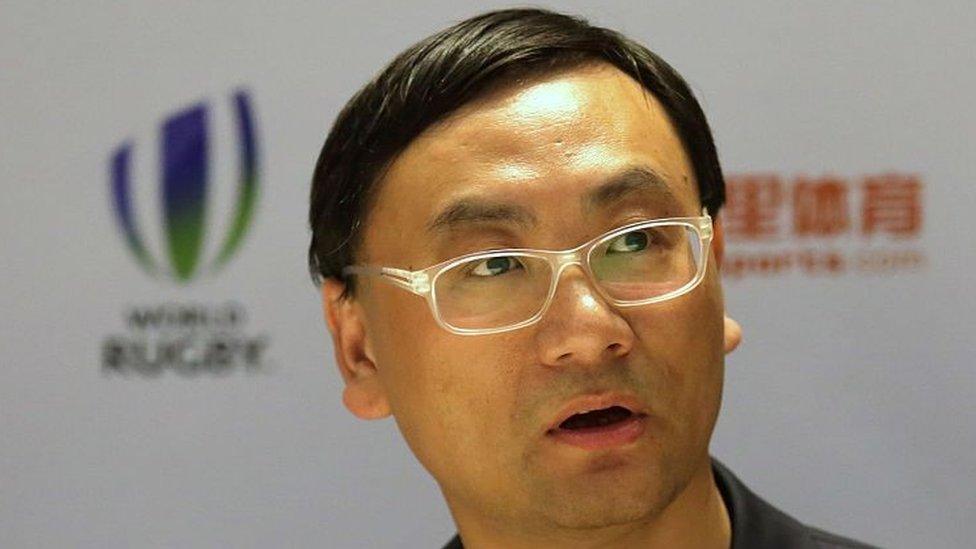
Dazhong Zhang of Alisports believes rugby in China will take off as a "sport of sportsmanship and character"
"We have a great partner in World Rugby and together we will work tirelessly to promote the development of rugby in China with a goal of inspiring one million new players in five years," said Alisports chief executive Zhang Dazhong.
'Hot money'
So what's in it for Alibaba and Alisports?
"Sport in China is being closely aligned with the entertainment sector," says Simon Chadwick, professor of sports enterprise at the University of Salford, and who has closely studied sport in the country.
"E-commerce and digital companies such as Alibaba, they need content, and sport is a great way of doing that."

Alisports is the sports division of e-commerce giant Alibaba
Indeed only last week sport was included in a restructuring of Alibaba's digital entertainment assets, part of a new division which will have a 10bn yuan (£1.2bn; $1.5bn) fund for new projects.
"Chinese people talk about 'hot money' in sport, but they don't mean it has been fraudulently acquired," says Prof Chadwick.
"It is essentially investors trying to second-guess the sports market to make a return on their investment. It is essentially sports property speculation in the way we have seen in China with physical property speculation."
Olympic boost
China is a country, which - for international prestige and "soft power" reasons - likes to see its sportsmen and women achieve on the global stage and Olympic sports are therefore given preferential state support and approval.
So rugby's inclusion in the Rio 2016 Olympics this year can only further help herald a new beginning for the sport in China.
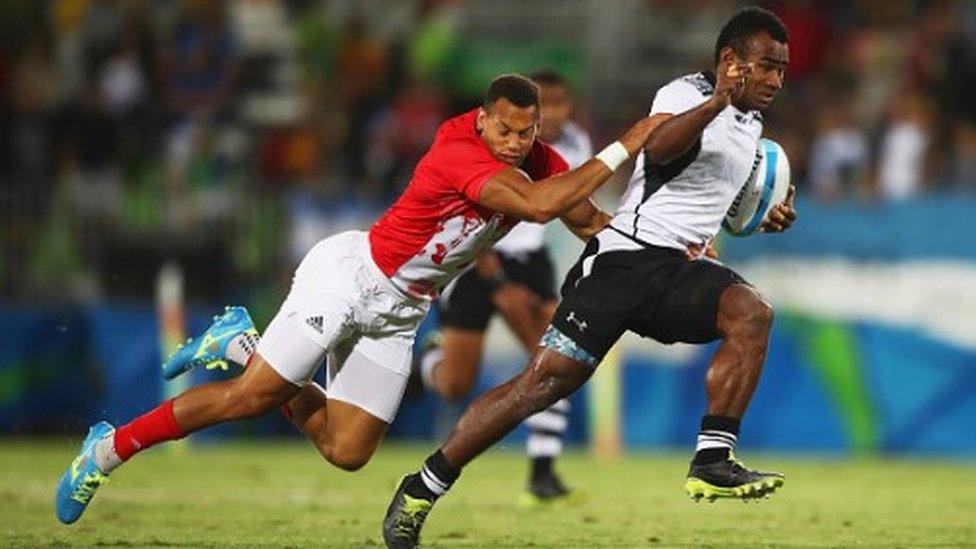
The sevens version of rugby union is now part of the Olympic Games
Interestingly, the sport does already have a foothold in the country, built on a couple of diverse influences.
"The growth in popularity of rugby in China actually predates what is happening now," says Prof Chadwick.
"The Chinese armed forces have been playing rugby for a number of years. They have believed that rugby is one of the best ways to develop the skills of their personnel, involving as it does strength, teamwork and decision-making.
"The consequence of this is that when people then leave the armed forces they want to continue playing the game, and set up teams and clubs."
'Sporting economy'
Alongside the army legacy, the wider history of the game in China includes its relationship with Hong Kong, where British expats played the game for decades prior to the handing over of the territory to the mainland in 1997.
In fact the sevens version of the game has become virtually synonymous with Hong Kong, with the annual tournament there launched 40 years ago.
Hong Kong does have a separate team - in World Rugby's international rankings it is rated 25th, with China at 68 - but its rugby legacy for China is strong.
Indeed, Hong Kong Rugby Union's chief executive Vern Reid says they have a role to play in helping to develop the sport in China., external
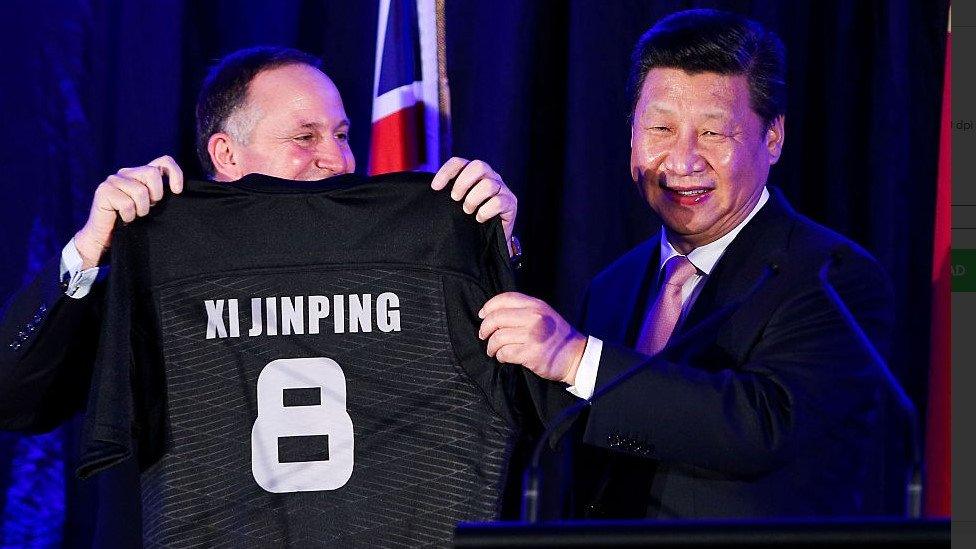
President Xi Jinping wants China to be a "great sports nation"
With what seems to be a strong and sustainable platform being put in place for rugby union in China, it could become not only a major force on the international stage but also have what World Rugby calls "real major event hosting potential".
Prof Chadwick says the Chinese will give the task their best efforts. "One of the big misconceptions is that it is only football that is looking to expand in China," he says.
"The country is trying to develop the world's biggest sporting economy, which also includes the likes of table tennis and basketball, as well as sports equipment.
"Rugby union had already got a foothold in the country, and its growth is now part of that bigger sporting picture."